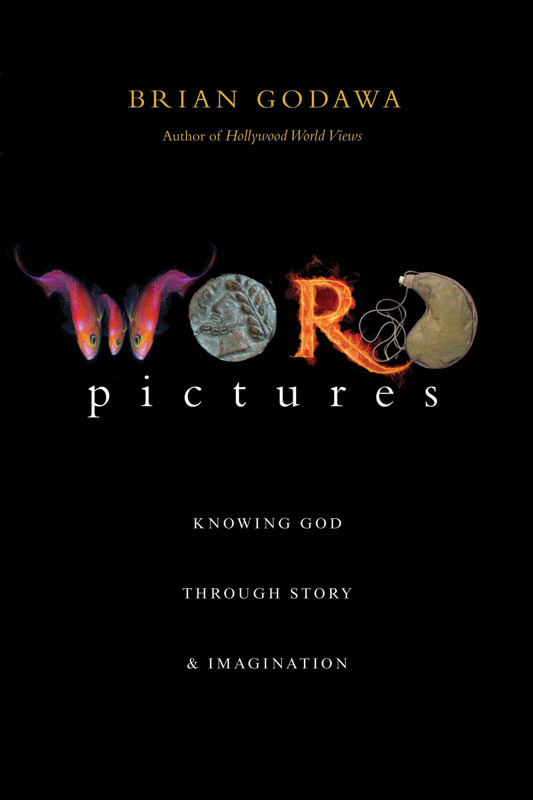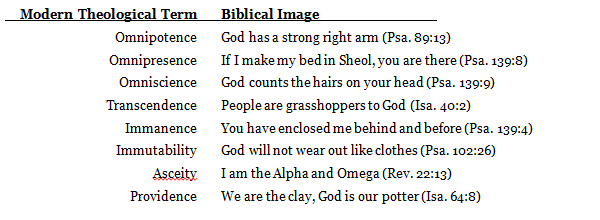Word Vs. Image, Part 2
It was certainly an enlightening moment in my own life when I came to realize my modernist prejudice in considering modern theological terms superior to biblical imagery and story. The chart below is an example of the kind of comparisons I had to make to reflect upon my modernizing tendency. I had come to prefer theological technical terms over their biblical images and metaphors.
C.S. Lewis pointed out that the technical term for God, “The transcendent Ground of Being,” is simply not as rich or full of meaning as the scriptural metaphor “Our Father who art in heaven.”1 Of course, the creation of theological terms is not inherently wrong, and metaphors are not the only way in which Scripture communicates God’s attributes. But I have to be careful that my theological shorthand will not overshadow or replace biblical longhand. The very theological words themselves reflect the modernist tendency to reduce truth to scientific terminology (every word having the suffix of “ology” or “ence”), which may ultimately depersonalize my faith and cast theology as a “scientific” study rather than a holistic biblical relationship with God.
Scholar Peter J. Leithart goes so far as to say that theology as we modern Christians understand it is against the biblical approach to truth, precisely because theology uses a professional language that is academic and obscure, “whereas the Bible talks about trees and stars, about donkeys and barren women, about kings and queens and carpenters.”
Theology tells us that God is eternal and unchangeable in His being, wisdom, power, holiness, justice, goodness and truth. The Bible tells us that God relents because He is God (Joel 2:13-14), that God is “shrewd with the shrewd” (Psa. 18:25-29), that he rejoices over us with shouting (Zeph. 3:14-20), and that He is an eternal whirlwind of triune communion and love. Theology is a “Victorian” enterprise, neoclassically bright and neat and clean, nothing out of place. Whereas the Bible talks about hair, blood, sweat, entrails, menstruation and genital emissions.2
Israel’s theology was told as stories. The organizing principles of Jewish theology are characteristically expressed through narratives of creation, election, exodus, monarchy, exile and return.3 So it was most appropriate when Jesus and the Apostles proclaimed the New Covenant as the fulfillment of those stories—in stories and parables as well. Wright, a Pauline scholar, points out that even the Apostle Paul’s most “emphatically ‘theological’ statements and arguments are in fact expressions of the essentially Jewish story now redrawn around Jesus.”4 He points out that for the early Christians, disputes “were carried on not so much by appeal to fixed principles, or to Jewish scripture conceived as a rag-bag of proof-texts, but precisely by fresh retellings of the story which highlighted the points at issue…not a theory or a new ethic, not an abstract dogma or rote-learned teaching, but a particular story told and lived.”5
 It would not be an exaggeration to suppose that Jesus would probably be scolded by conservative Evangelical theologues for not taking the Kingdom of God more seriously, because he seemed to spend most of his time walking around telling confusing stories rather than tightly organized three-point sermons. And even worse, Jesus would often avoid explaining those stories, preferring the “dangerous” ambiguity that modern Evangelicals complain leads to an unclear “Gospel presentation” or subjective interpretation (Matt. 13:10-15). Jesus just wasn’t precise enough by modern theological standards. Jesus just wasn’t a modern Evangelical.
It would not be an exaggeration to suppose that Jesus would probably be scolded by conservative Evangelical theologues for not taking the Kingdom of God more seriously, because he seemed to spend most of his time walking around telling confusing stories rather than tightly organized three-point sermons. And even worse, Jesus would often avoid explaining those stories, preferring the “dangerous” ambiguity that modern Evangelicals complain leads to an unclear “Gospel presentation” or subjective interpretation (Matt. 13:10-15). Jesus just wasn’t precise enough by modern theological standards. Jesus just wasn’t a modern Evangelical.
- Kevin J Vanhoozer, “The Semantics of Biblical Literature,” in Hermeneutics, Authority and Canon, eds. D.A. Carson and John D. Woodbridge (Grand Rapids, Mi.: Zondervan Publishing, 1986), p. 78. ↩
- Peter Leithart, Against Christianity (Moscow, Id.: Canon Press, 2003), pp. 46-47. ↩
- Wright, New Testament, p. 215. ↩
- Wright, New Testament, p. 79. ↩
- Wright, New Testament, p. 456. ↩










































To quote something I saw on tumblr, “Canon Jesus is so much cooler than fanfic Jesus.”
Not sure I understand your meaning, bad_cook.
It’s nerdspeak for “Jesus from the Bible is cooler than popular-interpretation Jesus.” It seems people get into a rut of thinking about Jesus as some kind of flat figurehead that holds lambs in front of pastel backgrounds, which you touched on, when Jesus was actually more dynamic and…human-feeling, I guess, in the Bible.
And there’s room in the idea of “fanfic Jesus” to tangent off into talking about Jesus-allegories in Christian fiction falling into that same rut of being rather flat and unapproachable, unengaging, or just unrelatable, when Jesus is supposed to be the approachable, engaging, and relatable aspect of God.
Gotcha. Good points. I also think the same thing about Christian’s Platonic type notions of God the Father as more the emotionless inhuman Voice in the Ten Commandments with Charlton Heston. Not so in the OT. He is very passionate, angry, romantic etc., which both Liberals and Conservatives don’t like because it doesn’t fit their picture of how God should be.
I depict Yahweh in my novels as having quite a sense of humor himself. Especially when he shows up to give Abraham’s calling right in the middle of Abraham making love to Sarai. Most people don’t realize how connected spirituality and sexuality really is. 🙂
That is fascinating, and I agree, especially that Jesus was, is, surely not a modern Evangelical.
Looking at the table of the theological terms contrasted with the Biblical imagery, I can’t help but feel that the Biblical imagery leaves room to misunderstand, to think of God as only another god, a religious entity or concept. “God has a strong right arm” does not specify that His arm is infinitely strong, that all strength has its ultimate source in Him.
I always enjoy finding a new quote from C.S. Lewis that I hadn’t known about before — does anyone know which of his writings this quotations was originally taken from? But I can’t help but thinking that the scriptural version of the bland theological definition of God as “the transcendent Ground of Being” is really “I AM.” Certainly God as the “I AM” is the base of all being and existence, but maybe we should look at His highest name also as the ground of narrative and story, the basis of all action and moving and doing.
Bainespal,
The Lewis quote is in Selected Literary Essays, pages 251-265
I think we need both–when Jesus told his stories, he was dealing with a society that had the Ten Commandments, knew the “facts–” in our society, we don’t really have ground for either.
Hey Brian,
Great excerpt, and really quite helpful in my thinking about what’s wrong with Christian popular culture today: an allergy to ambiguity. The best Christian popular culture, to my mind, is that which doesn’t preach and so bore or scare non-Christians away. The best stuff vibrates with a sort of parabolic resonance that invites people to come further in and explore further. Thanks.
Peace,
Ted
Thanks, Ted. I like that. “Allergy to ambiguity.” It is scary to not have the “certainty” our modern minds crave for. But it is also exciting and faith oriented, eh?
Brian,
I read your book, Word Pictures, a couple years ago and posted a review on my blog. It was refreshing to read the importance of story in the Bible and that God being the creator of the imagination doesn’t dismiss or shun it like those in current evangelicalism.
I consider your book a must read for Christian artists along with Art and the Bible by Schaeffer, Imagine by Steve Turner, and The Christian Imagination by Ryken.
Thanks for writing a much needed book!
Marion
Thanks, Marion!
In case you would like to know, my latest book, Myth Became Fact, takes the next step in developing my Biblical theory of subversion that has become my own strategy in storytelling.
Brian,
I will look for your latest book when it’s published. Thanks for letting me know.
Marion
It’s available right now only on Amazon:
http://www.amazon.com/Myth-Became-Fact-Storytelling-Imagination/dp/0985930969/ref=sr_1_1?s=books&ie=UTF8&qid=1369014172&sr=1-1
Our sermon last night reflected this a little. He was talking about Psalm 139, and pointed out that the Psalm doesn’t say, as theologians would, ‘God is omniscient’. It says ‘God knows ME’.
It was a very interesting sermon – the speaker was actually translating directly from the Hebrew as he went along! And he brought out a lot of interesting things.
Cool!
When I walk into the Christian book section, and see the bewildering array of books on understanding the Bible and improving my life, I wonder how people managed for so long with just the Bible.
Here we are, always watching movies and reading books, yet we miss the story that the Bible tells us. Though, as John Eldridge writes, our stories are often reflections of The Story:
“Every story, great and small, shares the same essential structure because every story we tell borrows its power from a Larger Story, a Story woven in the fabric of our being…
“All of these stories borrow from the Story. From Reality. We hear echoes of it through our lives. Some secret written on our hearts. A great battle to fight, and someone to fight for us. An adventure, something that requires everything we have, something to be shared with those we love and need.
“There is a Story that we just can’t seem to escape. There is a Story written on the human heart.”
Good thoughts, DD,
That is why when I watch a movie about repentance like Faster
or about abstinence and marriage like 17 Again
or about grace like Warrior
or about justice like Machine Gun Preacher
I feel myself affirmed deeply about the Biblical values I hold embodied in my modern context through story. Movies are more enriching to my life for the Gospel than sermons by far.
If anyone wants to do a little film study, they should compare Machine Gun Preacher and End of the Spear. Not only do they depict two opposite views (extremely so) on how Christians in the missionary field should behave, they are very different in their approach to filmmaking.
One is subdued and the other is very realistic. The irony is that less people will see Machine Gun Preacher, which I think is the more important film, because of its realism (and R rating).
I recall some didn’t want to watch The Passion because it was rated R. Probably because there are those who automatically equate R with evil or porn. Sometimes, though, adult just means adult. That’s why the Song of Solomon isn’t taught in Sunday school. Not because it is bad, but because it has what is generally considered adult content.
I heartily agree with you DD. I would add the caveat that I do believe there are some called to preach the Gospel and others to rescue the orphans and that each has a different method, depending on the calling.
But here is the movieblog analysis I wrote on Machine Gun Preacher:
http://godawa.com/movieblog/machine-gun-preacher/